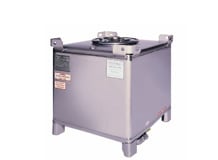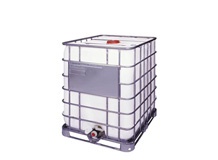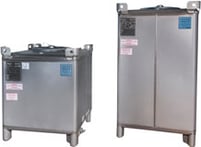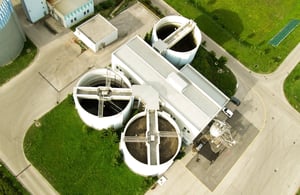 Wastewater treatment facilities can cost millions of dollars to set up and run effectively. A portion of those costs goes to storing and transporting the chemicals used to treat the water. While the chemical storage tanks are a small portion of the overall cost, the ability to store and easily transport chemicals is vitally important to the operations of the water treatment facility. Without the chemicals, there is no way to treat the water. Stainless steel totes are an ideal storage and transportation solution to ensure that the treatment chemicals are available and readily accessible when needed.
Wastewater treatment facilities can cost millions of dollars to set up and run effectively. A portion of those costs goes to storing and transporting the chemicals used to treat the water. While the chemical storage tanks are a small portion of the overall cost, the ability to store and easily transport chemicals is vitally important to the operations of the water treatment facility. Without the chemicals, there is no way to treat the water. Stainless steel totes are an ideal storage and transportation solution to ensure that the treatment chemicals are available and readily accessible when needed.
IBC Benefits
There are many processes and chemicals used in a wastewater treatment facility. Strong acids and bases are used to neutralize the pH levels in the water. Chemicals such as chlorine are used to disinfect the water. Stainless steel IBCs are an excellent storage solution for these harsh chemicals. A wide variety of chemicals can be stored in stainless steel IBCs due to the durability and corrosion-resistance of stainless steel. Stainless steel totes are resilient, able to withstand both the tough factory conditions and the harsh chemicals stored inside the totes, making stainless steel an excellent storage solution for water treatment facilities. It is important to always make sure the chemicals in your process are compatible with stainless steel. A good place to check is the Cole-Parmer Chemical Resistance Database.
 The size of stainless steel IBCs is ideal for storing a relatively large amount of chemicals, while still being easy to move. The standard tote sizes are 350-gallons and 550-gallons. Totes can be picked up with a forklift, so they are easy to move across a facility to where the totes are needed. When chemicals run low, totes can be easily loaded on to a truck and sent off to a chemical distributor to be refilled. The ability to easily move totes is a huge benefit when storing chemicals at a large water treatment facility.
The size of stainless steel IBCs is ideal for storing a relatively large amount of chemicals, while still being easy to move. The standard tote sizes are 350-gallons and 550-gallons. Totes can be picked up with a forklift, so they are easy to move across a facility to where the totes are needed. When chemicals run low, totes can be easily loaded on to a truck and sent off to a chemical distributor to be refilled. The ability to easily move totes is a huge benefit when storing chemicals at a large water treatment facility.
IBC Rentals
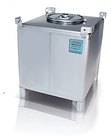 Our reliable IBC rental service is ideal for customers looking to take advantage of the benefits of stainless steel IBCs without the large up-front capitalized cost. Renting is an ideal solution for changes in production or short-term liquid storage needs. Metano has two capacities available for rent, 350-gallons and 550-gallons. Our dedicated customer service team will help find the best IBC solution for your application.
Our reliable IBC rental service is ideal for customers looking to take advantage of the benefits of stainless steel IBCs without the large up-front capitalized cost. Renting is an ideal solution for changes in production or short-term liquid storage needs. Metano has two capacities available for rent, 350-gallons and 550-gallons. Our dedicated customer service team will help find the best IBC solution for your application. 

